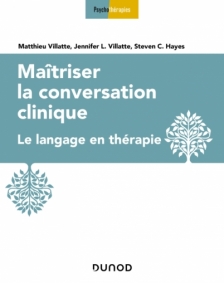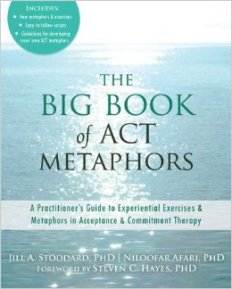This compelling book provides psychotherapists with evidence-based strategies for harnessing the power of language to free clients from life-constricting patterns and promote psychological flourishing. Grounded in relational frame theory (RFT), the volume shares innovative ways to enhance assessment and intervention using specific kinds of clinical conversations. Techniques are demonstrated for activating and shaping behavior change, building a flexible sense of self, fostering meaning and motivation, creating powerful experiential metaphors, and strengthening the therapeutic relationship. User-friendly features include more than 80 clinical vignettes with commentary by the authors, plus a “Quick Guide to Using RFT in Psychotherapy” filled with sample phrases and questions to ask.
“Beautifully written, this book imparts a deep understanding of language’s relationship to psychopathology and its effective use in psychotherapy. The theoretical presentation is exceptionally rich and the many examples of clinical application are particularly informative. Chapters address the fundamental tasks of therapy, from conducting functional assessments to building the client’s sense of self, fostering meaning and motivation, and enriching the therapeutic relationship. A ‘must read’ for psychotherapists and students.”
—Michelle G. Craske, PhD, Department of Psychology, University of California, Los Angeles
“A fascinating, very accessible account of RFT and its application to psychotherapy practice. The book offers a gorgeous balance of conceptual thinking and practical applications. It is a mind-expanding resource for psychotherapists of all orientations and levels of experience.”
—Jacqueline B. Persons, PhD, Director, Cognitive Behavior Therapy and Science Center, Oakland, California
“Inspiring. Important. This book challenges every psychotherapist to pause and look again at the most basic tool of our trade—language—and the enterprise of meaning making. Its broad scope offers the promise of connection across models and perspectives as well as better ways to lead our clients into transforming moments in therapy.”
—Susan M. Johnson, EdD, School of Psychology, University of Ottawa, Ontario, Canada
“In this remarkable book, Villatte, Villatte, and Hayes bring to life the ways in which language and the use of symbols structure our experience. They explore how language shapes the therapeutic relationship and process, as well as clients’ suffering, and how it can be a vehicle for igniting change. A cornerstone of this approach is RFT, beautifully articulated and described here. Clever, illuminating vignettes are sprinkled throughout. This book is a treasure trove of clinical wisdom with regard to the role of questioning, dialoguing, reflecting, and challenging in the therapy context. It is a gift to all psychotherapists.”
—Paul Gilbert, PhD, FBPsS, OBE, Head, Mental Health Research Unit, University of Derby, United Kingdom
Chapters by Matthieu Villatte:
Villatte, M. (2016). Evaluating In-Session Therapist and Client Behaviors From a Contextual Behavioral Science Perspective, In R. Zettle, S. C. Hayes, D. Barnes Holmes, & T. Biglan (Eds.), Handbook of Contextual Behavioral Science. Chichester, UK: Wiley Blackwell.
Levin, M. & Villatte, M. (2016). The Role of Experimental Psychopathology and Laboratory Based Intervention Studies in Contextual Behavioral Science. In S.C. Hayes, D. Barnes Holmes, R. Zettle, & T. Biglan (Eds.), Handbook of Contextual Behavioral Science. Chichester, UK: Wiley Blackwell.
First ACT manual published in French!
 Cet ouvrage propose la mise en application clinique d’une théorie du langage et de la cognition (la Théorie des Cadres Relationnels, TCR) – qui constitue le fondement de la thérapie d’acceptation et d’engagement (ACT).
Cet ouvrage propose la mise en application clinique d’une théorie du langage et de la cognition (la Théorie des Cadres Relationnels, TCR) – qui constitue le fondement de la thérapie d’acceptation et d’engagement (ACT).
La mise en pratique clinique de la TCR telle que la propose cet ouvrage permet aux thérapeutes d’utiliser la conversation clinique comme un outil au service du changement, dans tous les types de thérapies. Les auteurs proposent des moyens innovants pour conduire l’évaluation et l’intervention psychologiques en utilisant des types spécifiques de conversations cliniques.
L’ouvrage couvre l’ensemble des thèmes centraux de la prise en charge psychothérapeutique, tels que l’activation et le façonnage du changement comportemental, l’identité, le sens et la motivation, l’utilisation des métaphores et des exercices expérientiels, et la relation thérapeutique.
Plus de 80 vignettes cliniques commentées illustrent la manière dont les techniques sont appliquées dans la pratique clinique concrète. Des résumés de chapitre mettent l’accent sur les points clés à retenir, et un « guide d’utilisation de la TCR en psychothérapie » complète l’ouvrage avec des exemples de phrases et de questions à poser.
Chapter by Matthieu Villatte:
Villatte, M. (2020). Using Clinical RFT to Enhance ACT Interventions. In M. Levin, M. Twohig, & J. Krafft (Eds). Innovations in Acceptance and Commitment Therapy. Oakland, CA: New Harbinger.
Chapter by Matthieu Villatte:
Szabo, T., Long, D., Villatte, M., & Hayes, S. C. (2015). Mindfulness in contextual behavioral cognitive therapies. In K. W. Brown, J.D. Creswell, & R. M. Ryan (Eds.), Handbook of Mindfulness: Theory and Research. New York: The Guilford Press.
Chapter by Matthieu Villatte:
Plumb, J., Villatte, M., Hayes, S.C. (2014). Understanding and Taking Advantage of Experiential Work in Acceptance and Commitment Therapy. In Nathan C. Thoma and Dean McKay (Eds.), Working with Emotion in Cognitive-Behavioral Therapy: Techniques for Clinical Practice. New York: The Guilford Press.
Chapters by Matthieu Villatte:
Villatte, M., Vilardaga, R., & Monestes, J. L. (2012). How the self relates to others when perspective-taking is impaired? In L. McHugh & I. Stewart (Eds.), The self and perspective-taking. Oakland, CA: New Harbinger.
Villatte, J. L, Villatte, M., & Hayes, S. C. (2012). A naturalistic approach to transcendence: deictic framing, spirituality, and pro-sociality. In L. McHugh & I. Stewart (Eds.), The self and perspective-taking. Oakland, CA: New Harbinger.
Chapter by Matthieu Villatte:
Villatte, M., Villatte, J. L, & Monestes, J. L. (2014). Understanding and using Relational Frame Theory in experiential clinical practice. In J. Stoddard & N. Afari (Eds). The Big Book of ACT Metaphors: The Complete Guide to ACT Metaphors and Experiential Exercises. Oakland, CA: New Harbinger.
Chapter by Matthieu Villatte:
Pistorello, J., Hayes, S. C., Lillis, J., Long, D. M., Christodoulou, V., LeJeune, J., Villatte, J., Seeley, J., Villatte, M., Jeffcoat, T., Plumb-Vilardaga, J. C., & Yadavaia, J. (2013). Acceptance and Commitment Therapy (ACT) in classroom settings. In J. Pistorello (Ed.), Mindfulness and Acceptance for Counseling College Students: Theory and Practical Applications for Intervention, Prevention, and Outreach (pp. xxx-xxx). Oakland, CA: New Harbinger.

Chapter by Matthieu Villatte:
Rosen, D. C., Kanter, J. W., Villatte, M., Skinta, M. D., & Loudon, M. P. (2019). Becoming An Anti- Racist White Clinician. In M. T. Williams, D. C. Rosen, & J. W. Kanter (Eds). Eliminating Race- Based Mental Health Disparities: Promoting Equity and Culturally Responsive Care across Settings. Oakland, CA: New Harbinger.
Chapters by Matthieu Villatte:
Monestes, J.L. & Villatte, M. (2011). L’acceptation du cote du therapeute. In A. Heeren & I. Kostou (Eds.) Pleine conscience et Acceptation: Au cœur processuel de la troisième vague des thérapies comportementales et cognitives. Bruxelles : De Boeck.
Cheval, S., Villatte, M., & Monestes, J.L. (2011). Processus d’acceptation dans le traitement de la dysmorphophobie. In Heeren, A. & Kostou, I. (Eds.) Pleine conscience et Acceptation: Au cœur processuel de la troisième vague des thérapies comportementales et cognitives. Bruxelles : De Boeck.
Chapter by Matthieu Villatte:
Monestes, J.L. & Villatte, M. (2012). Une autre approche de la sante mentale: la therapie d’acceptation et d’engagement. In C. Tarquinio (Ed). Nouvelles approches en psychologie de la santé. Paris: Dunod.
Postface by Matthieu Villatte:
Villatte, M. & Monestès, J. L. (2009). Les Bases Theoriques de l’ACT in B. Schoendorff. Faire face à la souffrance. Paris: Retz.
Chapter by Matthieu Villatte:
Villatte, M. (2016). Les processus du langage et de la cognition impliques dans la psychopathologie. In J.L. Monestes & C. Bayens (Eds). L’approche transdiagnostique en psychopathologie. Paris: Dunod.
Chapter by Matthieu Villatte:
Villatte, M. (2017). La defusion en trois etapes: observer, analyser l’efficacite, accroitre la flexibilite. In J.L. Monestes (Ed). ACT La therapie d’acceptation et d’engagement en pratique. Paris: Elsevier-Masson.














